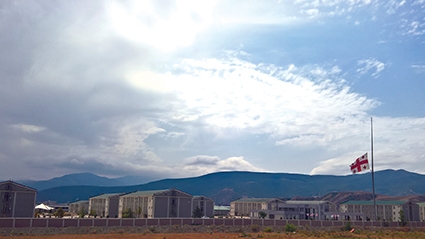Why Did Russia Do It?
This August 8 marked the ninth anniversary of the Russia-Georgia war and, quite naturally, public sentiments in Georgia have been high this week across the whole country. TV channels and various publications have been full of articles dedicated to the event. Amidst that, it is often easy to be misled as to why Russia invaded Georgia in 2008.
It should be noted from the beginning that the Russian attitudes toward Georgia are neither based on racial or nationalistic premises. Moscow simply pursues a policy entirely based on geopolitical calculations. It is not even about grabbing additional Georgian land per se, as many want to think. The stationing of Russian military forces in Abkhazia and South Ossetia and the effective occupation of those regions serves a number of military and security aims.
The primary reason for fostering separatist regimes in Abkhazia and South Ossetia in the early 1990s was to get hold of the vitally important Roki Pass and Abkhazian seashore. Both these routes directly connect the breakaway territories with the Russian mainland. In other words, without control over Abkhazia and South Ossetia, Moscow would have been simply shut off from processes in the South Caucasus.
Yet another significance of the breakaway regions for the Russians has been to keep their troops as close as possible to Tbilisi. This has been done in order to constantly have any Georgian government under pressure by ramping up or cooling military activities in the breakaway regions. Georgia will always be interesting for Moscow due to its geographical position in the South Caucasus. And it is not only about barring Tbilisi from joining NATO or the EU. Russia’s goal historically has been to minimize the importance of the Caucasus mountain range as a barrier between the South Caucasus and the Russian mainland.
An insecure, destabilized South Caucasus would be a serious problem for Moscow as it could spill over into the North Caucasus (Chechnya, Dagestan etc.). But it would be more problematic for Moscow if the South Caucasus was stable and pro-western. It is exactly for these reasons that the Russians have been threatening the road, pipeline and railway infrastructure running from east Georgia to the Black Sea shore and vital to the entire region. In Moscow’s thinking, an unstable South Caucasus full of Russian troops (as is the case in our time) is what would limit, if not entirely preclude, Georgia from joining western alliances.
Thus, these are those geopolitical imperatives which drive Russia’s foreign policy in the South Caucasus. We deal here not necessarily with the anti-Georgian government of Vladimir Putin, but rather a well-thought out strategy on the Russian part as to how to effectively project its military power into the region by limiting the barrier capacity of the Caucasus Mountains.
This would also mean that in the event of a regime change in Moscow, it is very unlikely that there would be a change in Russian foreign policy towards the South Caucasus. It is in Russia’s vital interests to keep Georgia at least very weak and unstable. On the opposite side, the loss of Georgia to the West would mean a rapid decrease of Russian power with much wider ramifications for the entire former Soviet space. “Russia-free” Georgia is a nightmare for Moscow as the Kremlin would then be less able to pressure Azerbaijan on export routes. Moreover, the Caspian energy corridor would again see its relevance and Central Asian gas could reach Europe.
Georgia in NATO/the EU would threaten Russia’s position in Armenia, too. Yerevan has its own reasons to be Russia’s close ally, but there are also powers which could challenge Armenia’s Russian dependence with NATO/EU member Georgia to their north. Moreover, the ability of Russia to operate its military base in Gyumri will also be questioned as it will be increasingly difficult to manage the base disconnected by NATO member Georgia. It would not even be so much about Russia’s ability to manage the Gyumri base, but the capabilities to counter prospective Western military bases in Georgia in case of military escalation.
It is all very much hypothetical, but I try to show through this scenario how strategically important Georgia is for Russia. And this again brings us back to the events of 2008. There is no point trying to find mistakes or missed opportunities in Georgia’s foreign policy since the break-up of the Soviet Union. Whatever the foreign policy course of Tbilisi had been, the country would still have experienced Russian interference. Russia’s geopolitical imperatives simply demand wider access to the South Caucasus which, unfortunately for Georgia, lies through its territory.
Emil Avdaliani












